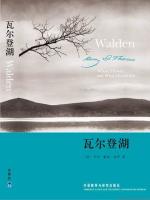Walden lake review
夏天、
Walden this book tells the story of
Thoreau who lived in Walden lake for two years and two months of life. Walden is
composed of 18 essays. In the process
of the cycle of four seasons, it records
in detail Thoreau's inner desire, conflict, disappointment and self-adjustment,
as well as the complex mental process ofhis desire again after adjustment. It goesthrough several cycles until the final
realization. It shows that the author uses it to challenge his personal and even human boundaries. But the challenge
is not the limitless hope for self-worth,
but the limitless power to recover from
an injury.
In the book of economics, the author describes the beginning of his life of self-sufficiency and his interactions with
farmers and neighbors. In the light of the ink, the author's great spirit shocked the depths of my heart. Through
experiencing the self-sufficient rural life, the author understands the hard life of farmers and criticizes the luxurious
life of the rich.Especially the word
“ hindrance”,it is a great attack on the hedonism and money worship of the American public at that time. The price of implied comfort in the eyes of the
rich is environmental damage. And this will hinder the development of society. Read carefully, harvest a lot.
Then, in "where I live; why I live", the
author describes the "real charm" of
Holwel where he lives. At the beginning
of the article, the author imagines the
countryside and cultivates it by himself. The author puts forward “Life or death,
we just pursue reality." It can reflect
the author's transcendentalism. At the same time, the word “just” can reflect the quiet of the author's pastoral life. The contrast between life and death can reflect the author's state of mind beyond the material world.
In reading “the blasphemy”, the
author discusses his view on the life of
reading. He thinks that "reading good
books, that is to say, reading real books
in a down-to-earth spirit, is a noble
training". It is well-known that reading is good for people, but the author compares reading to training. And when we train hard, we tend to acquire a skill, and when we look at it closely, we will see why. That is the reality of life into reading, we will continue to progress.
In "loneliness", the author describes
thefeeling peculiar to one's life in the
forest loneliness. Instead of describing it directly, the author usessome other
animals to reflect the feelings in his
heart. What Iadmire most is the
personification way he uses in this
paragraph. For example, “Bullfrogs call,
invite the night, the lake on the lake
on the wind blowing ripples. Swaying
alder and cypress. Stir up my feelings.” Through these dynamic words, the author sets off his inner peace and solitude. Especially the word "invite", very vivid image, which reflects the author’s inner loneliness. I can't help
thinking, what kind of person can
express his feeling through this simple
number word? That's what makes this book so fascinating, so unique and so compelling to the reader. This is the
source of the classic that has been
around for hundreds of years.
In "the visitor", the author exchanges
ideas about life with fishermen, hunters, poetsand philosophers, because the
author thinks that people who come to
this forest are "pilgrims". In my opinion, although the author chose to live in seclusion in this period, it does not mean that he does not want to communicate with others, and he also likes to communicate with others very much. Just like the person who lived in the mountains and forests in ancient
China, they also want their friends to come to visit them-selves and drink
with wine, feeling the beauty of
living in seclusion, and experiencing the infinite scenery of nature. What
impresses me most in this chapter is
the vivid and penetrating metaphor of theauthor---“I must cling to him like a
leech.” The author likens the spiritual
comfort of communicating with others to fresh blood, but he compared himself to frightening leech. It seems a little
extreme, but it's just right.
In planting “beans”, the author
expresses the joy of labor and harvest.
The author is not planting beans for his
own needs in life, but for his own self-esteem. By planting,harvesting and
selling the surplus beans, the author
experiences the happiness and self-esteem of life brought by labor in the
process. It gives me an image of a character who is happy in the
countryside.
In “animals as neighbors”, the author
describes some of the animals that lived with him on the shores of Walden lake. Theauthor personified these animals so
that theirfree images appeared on the
paper. By the time you get to this point, the reader often has a sense of relief. Let me can not help but praise the author's profound skills.
In “spring”, the author describes walden lake when spring comes. At last the
Walden frozes the author's mood also
became cheerful.Just like the old man
basking in the warm sunshine. Especially this one---"The coming of spring is
very much like the beginning of chaos,
the creation of the universe, the re-emergence of the golden age."He
explains the profound truth about the
resurrection of all things in spring.
Make the depth of the article, to a higher
level.
In “the conclusion”, the author tells everyone about his life style and ideal. The
author wants truth, not stupidity. When I calm down and think about it, which refers to the money worship and
hedonism of the people in the society at
that time. The author uses “stupidity” to express his inner firmness and reluctance to associate with others. The thought of it filled me with awe of the author.
When I finally finished reading this book, I gained peace of mind and spiritual sublimation. From my point of view, this is worthy of being a classic
that has been handed down for a
hundred years!



 京公网安备 11010802032529号
京公网安备 11010802032529号